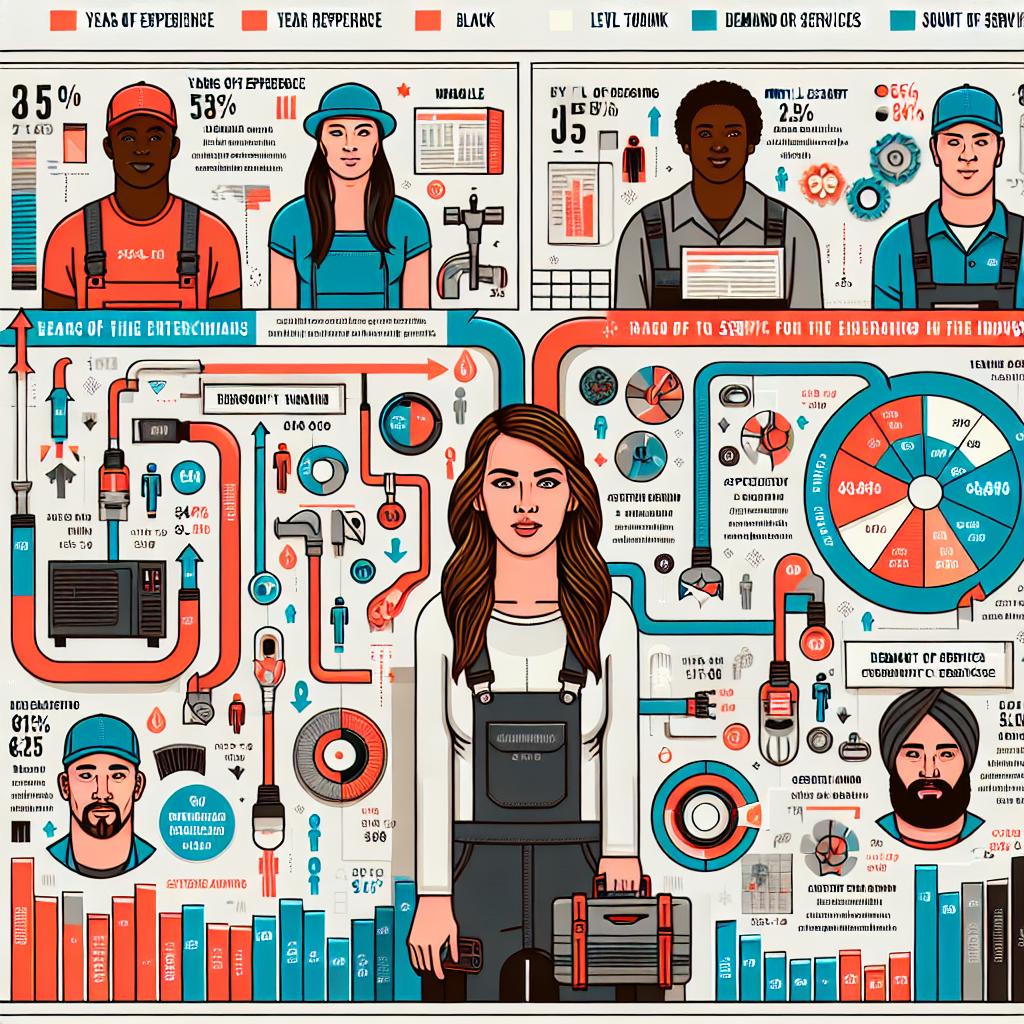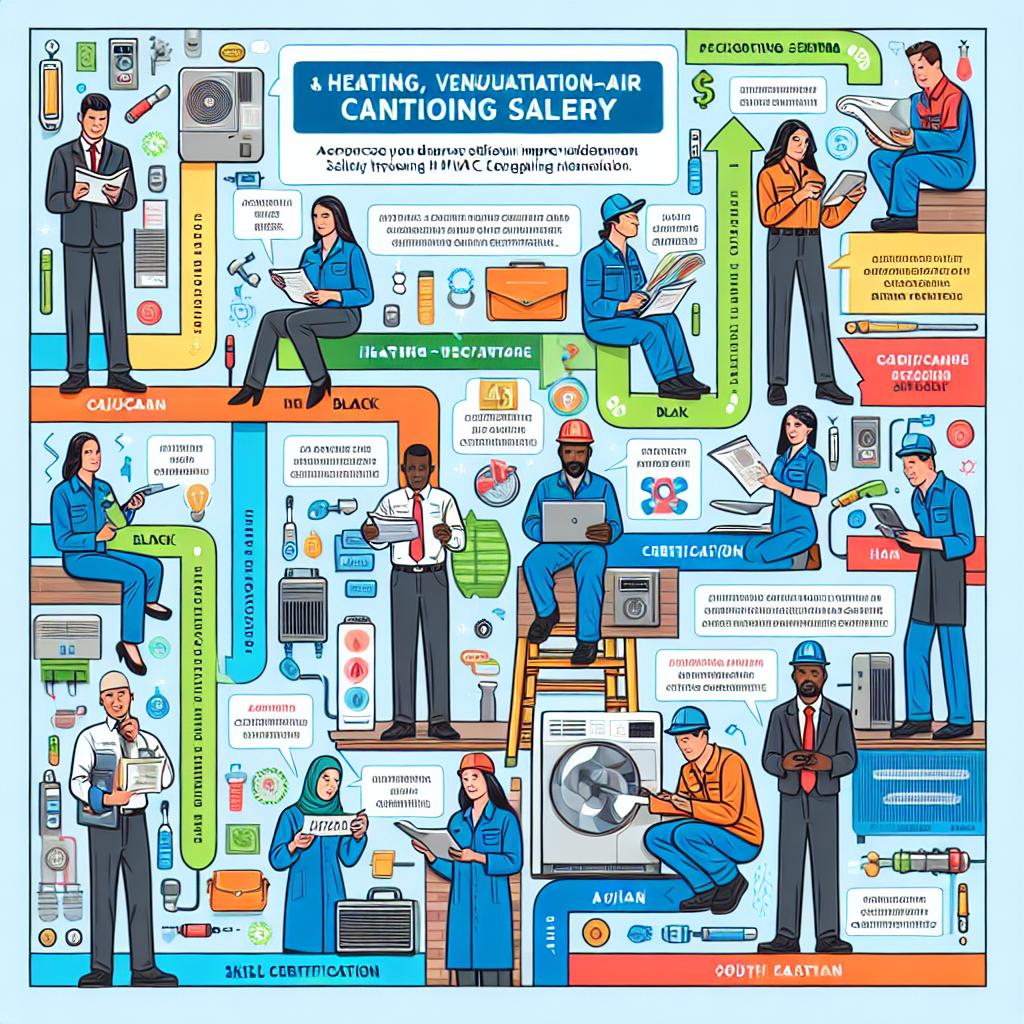In the ever-evolving world of home comfort, HVAC technicians emerge as the unsung heroes, ensuring that our indoor environments remain both cozy in winter’s chill and refreshing during summer’s heat. As we increasingly rely on climate control systems, the demand for skilled HVAC professionals continues to soar. But as they navigate the intricate world of heating, ventilation, and air conditioning, a lingering question persists: how much do HVAC techs truly earn for their expertise and tireless efforts? In this article, we delve into the financial landscape of HVAC technicians, exploring the factors that influence their salaries, the regional disparities, and the opportunities for growth within this essential industry. Join us as we uncover the numbers behind this critical trade and what it means for those aspiring to keep our spaces comfortable year-round.
Understanding HVAC Technician Salaries Across Different Regions
Geography plays a crucial role in determining HVAC technician salaries, with various factors influencing the pay scale. Major urban areas often present higher wages due to increased demand for skilled technicians and a higher cost of living. For example, technicians in cities like New York, San Francisco, and Los Angeles may earn significantly more than their counterparts in rural regions. This disparity arises from the concentration of commercial buildings, which require regular HVAC maintenance and installation services, increasing the demand for qualified professionals.
Here’s a quick look at average HVAC technician salaries across different regions:
| Region | Average Salary |
|---|---|
| Northeast | $55,000 |
| Midwest | $50,000 |
| South | $49,000 |
| West | $57,000 |
Apart from location, experience and certifications also significantly influence earnings. Technicians with specialized skills, such as those qualified to handle cutting-edge HVAC technologies or energy-efficient systems, can command higher salaries. Additionally, resources like local unions or collective bargaining agreements may further shape salary structures, offering benefits that enhance overall compensation packages.

Factors Influencing HVAC Technician Earnings in the Industry
Several elements play a crucial role in determining the salaries of HVAC technicians across the industry. Experience level is one of the most significant factors; seasoned professionals often command higher wages due to their knowledge and skill set. Additionally, the location of employment heavily influences pay rates, as urban areas typically provide more lucrative job opportunities compared to rural settings. Other factors include:
- Certification and Training: Technicians with specialized certifications or extensive training can negotiate better compensation.
- Industry Demand: Areas experiencing a surge in construction or renovation projects often see increased pay for HVAC technicians.
- Company Size: Larger firms may offer more competitive salaries and benefits compared to smaller companies.
Moreover, the type of work performed can also impact earnings. Technicians focusing on installation may earn differently than those specializing in maintenance or repair. Seasonal fluctuations in demand can affect income, with peak seasons offering opportunities for overtime. To illustrate these variations, the following table summarizes average annual salaries based on different factors:
| Factor | Average Salary |
|---|---|
| Entry-Level Technician | $35,000 – $45,000 |
| Experienced Technician | $50,000 - $70,000 |
| Specialized Technicians (e.g., refrigeration) | $65,000 – $85,000 |
| Geographic Area (Urban) | Up to $80,000 |

Career Advancement Opportunities for Increased HVAC Technician Income
For HVAC technicians looking to boost their income, exploring various career advancement opportunities can be a game-changer. Pursuing certifications in specialized areas—such as refrigeration, energy efficiency, or smart HVAC systems—can not only increase skillsets but also open doors to higher-paying positions. Additionally, gaining experience and furthering education through technical schools or online courses can place technicians in a competitive position for roles such as lead technician, designer, or systems engineer.
Another avenue for income growth is venturing into sales or installation management, where technicians can leverage their hands-on experience to transition into more strategic roles. Building a solid professional network can also lead to job opportunities in construction management or HVAC consulting. Many technicians find that enhancing their soft skills, such as customer service and project management, provides them with an edge in obtaining higher-paying positions, as these skills are essential for collaborative roles in larger projects.
| Career Role | Average Salary |
|---|---|
| Lead Technician | $60,000 – $80,000 |
| HVAC Designer | $70,000 – $90,000 |
| Sales Manager | $80,000 – $100,000 |
| Installation Manager | $65,000 – $85,000 |

Tips for Boosting Your HVAC Salary Through Skills and Certifications
Enhancing your HVAC salary often hinges on expanding your skill set and obtaining relevant certifications. Here’s how you can elevate your professional profile:
- Specialized Certifications: Consider certifications like EPA Section 608 for refrigerant handling, NATE for technical expertise, and HVAC Excellence for comprehensive knowledge. These can significantly increase your marketability.
- Advanced Training: Pursue training in emerging technologies such as smart HVAC systems or renewable energy solutions. Keeping up-to-date with industry innovations can make you indispensable.
- Soft Skills Development: Cultivate skills like customer service, problem-solving, and effective communication, which can lead to managerial opportunities and higher wages.
Furthermore, networking within the industry can provide access to better job opportunities. Becoming a member of professional organizations can open doors to resources and mentorship. Here’s a brief overview of well-regarded organizations:
| Organization | Focus Area | Benefits |
|---|---|---|
| ACC | Energy Efficiency | Access to training and certifications |
| ASHRAE | Standards Development | Networking and resources |
| NATE | Technical Excellence | Industry-recognized certification |
Q&A
Q&A: How Much Do HVAC Technicians Make?
Q: What is the average salary for HVAC technicians in the United States?
A: As of 2023, the average salary for HVAC technicians in the U.S. hovers around $50,000 per year. However, this figure can vary widely based on factors such as location, experience, and specialization.
Q: What factors influence HVAC technician salaries?
A: Several factors can influence pay, including geographical location, level of experience, type of employment (residential vs. commercial), and specific skill sets (such as working with certain technologies or certifications). For instance, technicians in urban areas might earn more due to a higher cost of living, while those with advanced certifications can command greater salaries.
Q: How does experience affect an HVAC technician’s earnings?
A: Experience plays a significant role in salary potential. Entry-level technicians may start around $35,000, but with 5-10 years of experience, they could see their earnings rise to $60,000 or more. Technicians with over a decade of specialized experience could potentially exceed $80,000 annually.
Q: Are there opportunities for overtime or bonuses in this field?
A: Yes! Many HVAC technicians have the opportunity to earn overtime, especially during peak seasons, as demand for heating and cooling increases. Additionally, some employers offer performance bonuses, which can supplement a technician’s base salary significantly.
Q: What is the job outlook for HVAC technicians?
A: The job outlook for HVAC technicians is quite positive. The U.S. Bureau of Labor Statistics projects a growth rate of 5% from 2021 to 2031, which is roughly as fast as the average for all occupations. This growth is driven by the need for climate control and energy-efficient systems in homes and commercial buildings.
Q: Do HVAC technicians receive benefits?
A: Yes, many HVAC technicians receive comprehensive benefits, including health insurance, retirement plans, paid time off, and sometimes even tools or uniform allowances. These benefits contribute to their overall compensation package.
Q: What can technicians do to increase their earning potential?
A: Technicians can enhance their earning potential by pursuing additional certifications, gaining specialized training, or branching into related areas such as HVAC design or sales. Extra skills not only make technicians more valuable to employers but may also open up higher-paying job opportunities.
Q: Is working as an HVAC technician a stable career choice?
A: Indeed, working as an HVAC technician is often considered a stable career choice. With continual demand for heating, cooling, and refrigeration systems in various settings, coupled with advancements in technology driving the need for skilled technicians, this field presents a reliable job opportunity for those looking for stability and growth.
Q: How can someone start a career in HVAC?
A: Starting a career in HVAC typically involves completing a formal training program, which can be found at trade schools or community colleges. Many programs include hands-on experience and may offer apprenticeships, where individuals can learn under the guidance of experienced professionals while earning wages.
Q: What makes HVAC a rewarding career choice?
A: Beyond financial considerations, HVAC offers the satisfaction of solving practical problems and improving people’s comfort and well-being. The job often allows for independent work, travel, and diverse day-to-day challenges, making it an engaging career for those who enjoy hands-on work and interacting with various clients.
Insights and Conclusions
In the dynamic realm of HVAC technology, the income prospects for technicians reveal a blend of experience, skill, and market demand. While entry-level technicians may begin their journey with a modest salary, the potential for growth is substantial. As they refine their craft and navigate the various career paths—from residential services to specialized commercial systems—their earning potential can significantly increase, reflecting both expertise and the essential nature of their work.
Ultimately, the financial rewards in the HVAC industry are not merely a reflection of hourly rates or salaries but also of the dedication and commitment technicians bring to their craft. As the demand for reliable climate control continues to rise, the value of skilled HVAC professionals will remain a vital component of our modern life. So, whether you’re considering a career in this field or simply seeking to understand the market, remember that an HVAC technician’s income is just one piece of a much larger puzzle—one that is vital to keeping our environment comfortable, safe, and efficient.

